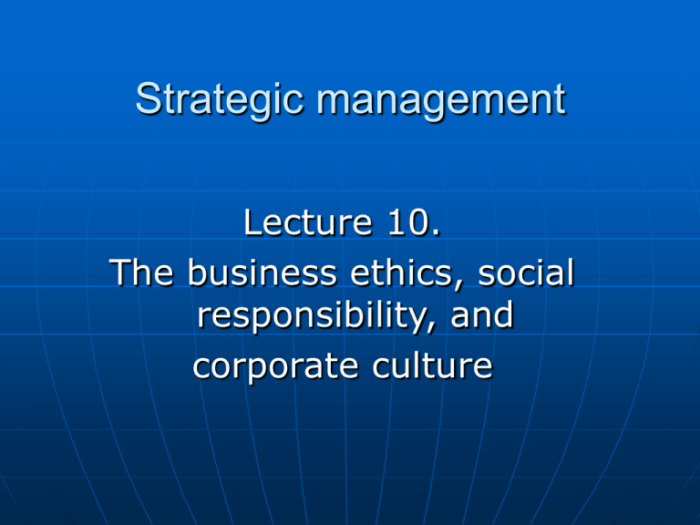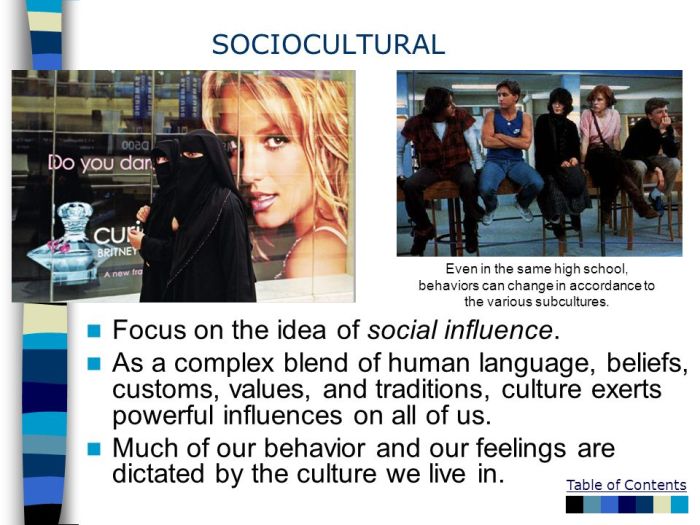Culture exerts an influence on all business disciplines, shaping ethical decision-making, organizational behavior, marketing strategies, global operations, and innovation. Understanding the profound impact of culture empowers businesses to navigate diverse markets, foster inclusive workplaces, and drive success in an interconnected global economy.
From shaping consumer preferences to influencing cross-cultural negotiations, culture plays a pivotal role in every aspect of business operations. By recognizing and leveraging cultural diversity, organizations can unlock a wealth of opportunities while mitigating potential challenges.
Culture’s Impact on Business Ethics
Culture plays a significant role in shaping ethical decision-making within organizations. Cultural norms and values influence individuals’ perceptions of right and wrong, as well as their behavior in ethical dilemmas. For instance, in cultures that emphasize collectivism, individuals may prioritize the interests of the group over their own, while in individualistic cultures, personal interests may take precedence.
This can lead to different approaches to ethical decision-making in organizations operating in different cultural contexts.
Ethical Dilemmas Due to Cultural Differences
Cultural differences can create ethical dilemmas for organizations. For example, in some cultures, it may be acceptable to give gifts to government officials to expedite business processes, while in other cultures, such practices may be considered bribery. Similarly, the concept of whistle-blowing may be viewed differently across cultures, with some cultures valuing loyalty to the organization over reporting unethical behavior.
Balancing Cultural Values with Universal Principles
Organizations must navigate the challenges of balancing cultural values with universal ethical principles. While it is important to respect cultural diversity, there are certain ethical principles that should be upheld regardless of cultural context. For instance, organizations should strive to maintain transparency, accountability, and fairness in their operations, regardless of the cultural norms of the countries in which they operate.
Culture and Organizational Behavior

Culture significantly influences employee behavior and motivation within organizations. Cultural factors shape communication styles, collaboration patterns, and conflict resolution mechanisms. For instance, in high-context cultures, communication may be more indirect and rely heavily on nonverbal cues, while in low-context cultures, communication tends to be more explicit and direct.
Effects on Employee Behavior and Motivation
Culture affects employee behavior and motivation in several ways. For example, in cultures that emphasize hierarchy and respect for authority, employees may be more likely to follow instructions without question, while in cultures that value autonomy and self-direction, employees may be more likely to question authority and take initiative.
Cultural Diversity and Organizational Effectiveness
Cultural diversity can enhance or hinder organizational effectiveness. On the one hand, it can bring a wide range of perspectives and experiences, leading to innovation and creativity. On the other hand, it can also create challenges in communication, collaboration, and conflict resolution.
Organizations must manage cultural diversity effectively to reap its benefits and mitigate its potential risks.
Culture’s Influence on Marketing and Consumer Behavior
Culture plays a crucial role in shaping consumer preferences and purchasing decisions. Cultural values influence what consumers consider desirable, how they perceive brands, and what products or services they choose to purchase. For instance, in cultures that emphasize saving face, consumers may be more likely to purchase luxury goods to demonstrate their social status.
Cultural Considerations in Marketing Campaigns
Marketing campaigns must consider cultural factors to be effective. For example, a campaign that uses humor may be successful in one culture but offensive in another. Similarly, a product that is well-received in one culture may not be accepted in another due to cultural differences in values and beliefs.
Adapting Marketing Strategies to Different Cultural Contexts
Organizations must adapt their marketing strategies to different cultural contexts. This involves understanding the cultural values, beliefs, and norms of the target market and tailoring marketing messages and products accordingly. Failure to consider cultural factors can lead to marketing campaigns that are ineffective or even counterproductive.
Culture and Global Business: Culture Exerts An Influence On All Business Disciplines

Culture has a significant impact on international business negotiations and partnerships. Cultural differences can affect communication, trust, and the perception of business practices. For instance, in cultures that emphasize long-term relationships, building trust is essential for successful business dealings, while in cultures that prioritize short-term gains, transactions may be more transactional in nature.
Cultural Factors in Cross-Cultural Communication and Trust
Cultural factors can create challenges in cross-cultural communication and trust. For example, in cultures that value direct communication, individuals may be more likely to speak their minds, while in cultures that emphasize politeness, individuals may be more indirect in their communication.
This can lead to misunderstandings and mistrust if not handled appropriately.
Strategies for Managing Cultural Differences, Culture exerts an influence on all business disciplines
Organizations must develop strategies for managing cultural differences in global business operations. This includes providing training on cultural awareness, encouraging open communication, and fostering a culture of respect and understanding. By effectively managing cultural differences, organizations can build strong relationships, negotiate effectively, and achieve success in international markets.
Culture and Innovation

Culture can both foster and hinder innovation within organizations. Cultural values and norms can shape the organization’s attitude towards risk-taking, creativity, and experimentation. For instance, in cultures that emphasize tradition and conformity, innovation may be seen as a threat to the status quo, while in cultures that value change and progress, innovation may be encouraged and rewarded.
Cultural Influences on Product Development
Cultural norms can influence the development of new products and services. For example, in cultures that value personal space, products that offer privacy and seclusion may be more successful, while in cultures that emphasize community, products that facilitate social interaction may be more popular.
Creating an Environment Conducive to Innovation
Organizations can create an environment conducive to innovation by fostering a culture that values diversity, encourages open communication, and rewards creativity. This involves creating a workplace where individuals feel comfortable sharing ideas, taking risks, and learning from their mistakes. By embracing cultural diversity and promoting a culture of innovation, organizations can enhance their ability to generate new ideas and develop successful products and services.
FAQ Guide
How does culture influence ethical decision-making in organizations?
Cultural norms shape ethical values, beliefs, and behaviors, influencing how individuals perceive and respond to ethical dilemmas within organizational contexts.
What are the challenges of balancing cultural values with universal ethical principles?
Balancing cultural values with universal ethical principles requires sensitivity, open-mindedness, and a willingness to engage in respectful dialogue. It involves recognizing the legitimacy of diverse perspectives while upholding fundamental ethical standards.
How can cultural diversity enhance organizational effectiveness?
Cultural diversity brings a wealth of perspectives, experiences, and ideas, fostering innovation, creativity, and problem-solving abilities. It promotes inclusivity, enhances employee engagement, and strengthens an organization’s ability to adapt to changing market dynamics.